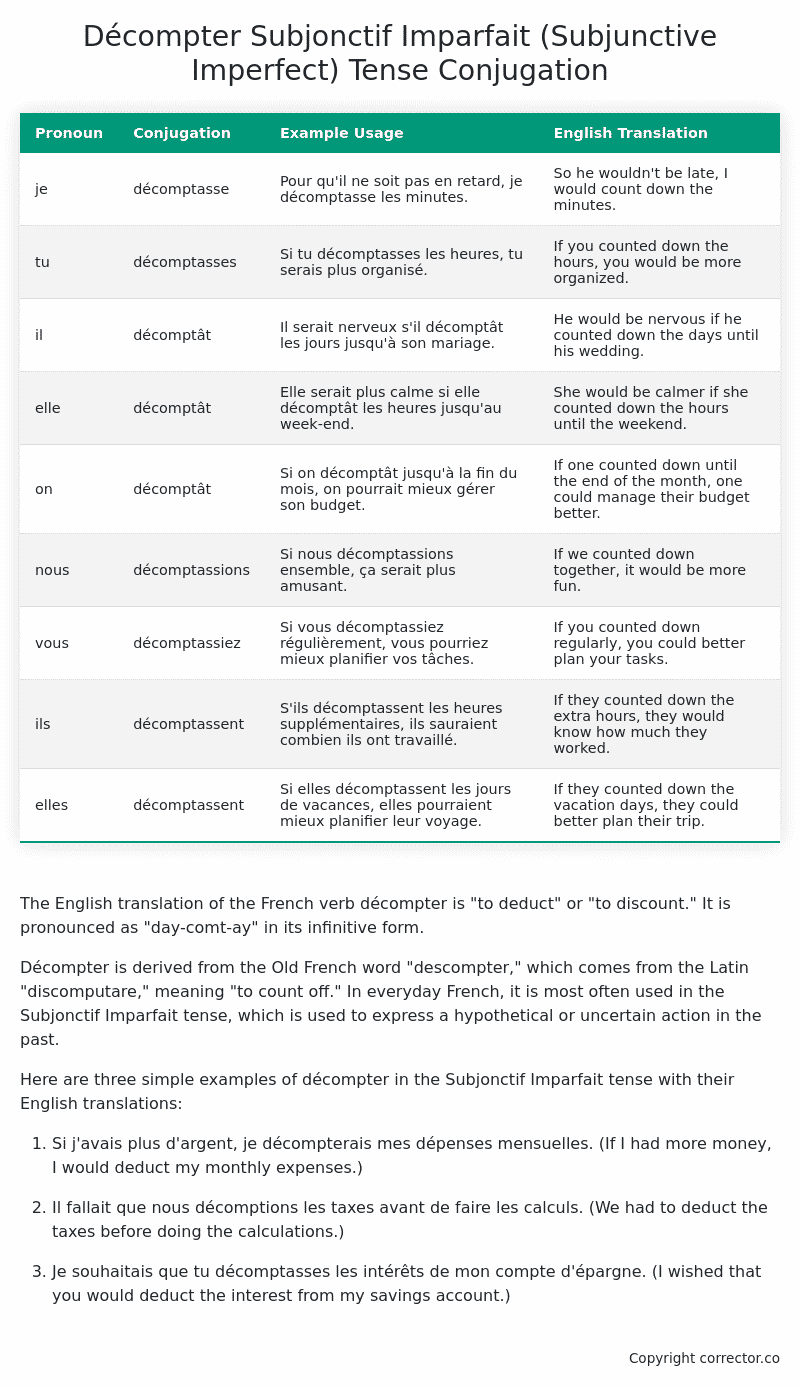Subjonctif Imparfait (Subjunctive Imperfect) Tense Conjugation of the French Verb décompter
Introduction to the verb décompter
The English translation of the French verb décompter is “to deduct” or “to discount.” It is pronounced as “day-comt-ay” in its infinitive form.
Décompter is derived from the Old French word “descompter,” which comes from the Latin “discomputare,” meaning “to count off.” In everyday French, it is most often used in the Subjonctif Imparfait tense, which is used to express a hypothetical or uncertain action in the past.
Here are three simple examples of décompter in the Subjonctif Imparfait tense with their English translations:
-
Si j’avais plus d’argent, je décompterais mes dépenses mensuelles. (If I had more money, I would deduct my monthly expenses.)
-
Il fallait que nous décomptions les taxes avant de faire les calculs. (We had to deduct the taxes before doing the calculations.)
-
Je souhaitais que tu décomptasses les intérêts de mon compte d’épargne. (I wished that you would deduct the interest from my savings account.)
Table of the Subjonctif Imparfait (Subjunctive Imperfect) Tense Conjugation of décompter
| Pronoun | Conjugation | Example Usage | English Translation |
|---|---|---|---|
| je | décomptasse | Pour qu’il ne soit pas en retard, je décomptasse les minutes. | So he wouldn’t be late, I would count down the minutes. |
| tu | décomptasses | Si tu décomptasses les heures, tu serais plus organisé. | If you counted down the hours, you would be more organized. |
| il | décomptât | Il serait nerveux s’il décomptât les jours jusqu’à son mariage. | He would be nervous if he counted down the days until his wedding. |
| elle | décomptât | Elle serait plus calme si elle décomptât les heures jusqu’au week-end. | She would be calmer if she counted down the hours until the weekend. |
| on | décomptât | Si on décomptât jusqu’à la fin du mois, on pourrait mieux gérer son budget. | If one counted down until the end of the month, one could manage their budget better. |
| nous | décomptassions | Si nous décomptassions ensemble, ça serait plus amusant. | If we counted down together, it would be more fun. |
| vous | décomptassiez | Si vous décomptassiez régulièrement, vous pourriez mieux planifier vos tâches. | If you counted down regularly, you could better plan your tasks. |
| ils | décomptassent | S’ils décomptassent les heures supplémentaires, ils sauraient combien ils ont travaillé. | If they counted down the extra hours, they would know how much they worked. |
| elles | décomptassent | Si elles décomptassent les jours de vacances, elles pourraient mieux planifier leur voyage. | If they counted down the vacation days, they could better plan their trip. |
Other Conjugations for Décompter.
Le Present (Present Tense) Conjugation of the French Verb décompter
Imparfait (Imperfect) Tense Conjugation of the French Verb décompter
Passé Simple (Simple Past) Tense Conjugation of the French Verb décompter
Passé Composé (Present Perfect) Tense Conjugation of the French Verb décompter
Futur Simple (Simple Future) Tense Conjugation of the French Verb décompter
Futur Proche (Near Future) Tense Conjugation of the French Verb décompter
Plus-que-parfait (Pluperfect) Tense Conjugation of the French Verb décompter
Passé Antérieur (Past Anterior) Tense Conjugation of the French Verb décompter
Futur Antérieur (Future Anterior) Tense Conjugation of the French Verb décompter
Subjonctif Présent (Subjunctive Present) Tense Conjugation of the French Verb décompter
Subjonctif Passé (Subjunctive Past) Tense Conjugation of the French Verb décompter
Subjonctif Imparfait (Subjunctive Imperfect) Tense Conjugation of the French Verb décompter (this article)
Subjonctif Plus-que-parfait (Subjunctive Pluperfect) Tense Conjugation of the French Verb décompter
Conditionnel Présent (Conditional Present) Tense Conjugation of the French Verb décompter
Conditionnel Passé (Conditional Past) Tense Conjugation of the French Verb décompter
L’impératif Présent (Imperative Present) Tense Conjugation of the French Verb décompter
L’infinitif Présent (Infinitive Present) Tense Conjugation of the French Verb décompter
Struggling with French verbs or the language in general? Why not use our free French Grammar Checker – no registration required!
Get a FREE Download Study Sheet of this Conjugation 🔥
Simply right click the image below, click “save image” and get your free reference for the décompter Subjonctif Imparfait tense conjugation!

Décompter – About the French Subjonctif Imparfait (Subjunctive Imperfect) Tense
Formation
Common Everyday Usage Patterns
Interactions with Other Tenses
Subjonctif Présent
Indicatif Passé Composé
Conditional
Conditional Perfect
Summary
I hope you enjoyed this article on the verb décompter. Still in a learning mood? Check out another TOTALLY random French verb conjugation!


